| Srl | Item |
| 1 |
ID:
105630


|
|
|
|
|
| Publication |
2011.
|
| Summary/Abstract |
The foreign policy of the Islamic Republic of Iran is widely misunderstood. On the one hand many experts regard the Iranian foreign policy as being essentially ideology driven while on the other hand a significant body of opinion believes that ideology is a convenient smokescreen for Iran's pursuit of its national interests. This paper examines the role of ideological, political and institutional actors in the context of the Islamic Republic's quest for consensus and cohesion. The purpose is to delve into the relationship between these factors with a view to understanding how this complex interaction impacts on foreign policy formulation and implementation. It is proposed that any improvement to the current system requires a more transparent strategic direction.
|
|
|
|
|
|
|
|
|
|
|
|
|
|
|
|
| 2 |
ID:
105627


|
|
|
| 3 |
ID:
105624
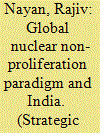

|
|
|
| 4 |
ID:
105626


|
|
|
| 5 |
ID:
105632


|
|
|
|
|
| Publication |
2011.
|
| Summary/Abstract |
This article examines the different narratives on the 'Madhes' identity, and situates this discourse in the ethno-linguistic mosaic of the Terai region as well as the larger Nepali political scenario, by identifying the reasons for their increasing assertiveness in politics. The paper argues that exploitation and discrimination by the upper-caste Pahadi migrant communities (especially during the monarchy period) and the Nepali state has played an important role in the consolidation of the Madhesi identity. While the mainstream Madhes parties have adopted a soft stand on the issue, the armed groups are demanding outright 'independence'. Of late, the Madhesi movement has suffered because of differences (over objectives as well as methods) between various Madhes groups. The fragmentation of the movement has also dragged India into controversy. Both Pahadi and Madhesi groups are critical of the role played by India and this is likely to affect India's security and economic interests in Nepal.
|
|
|
|
|
|
|
|
|
|
|
|
|
|
|
|
| 6 |
ID:
105629
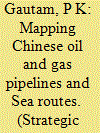

|
|
|
|
|
| Publication |
2011.
|
| Summary/Abstract |
China is pursuing an energy policy to alleviate its import dependence, diversify the sources and routes of imported oil and prepare for supply disruption. China's import of hydrocarbons is growing rapidly. Besides sea transport from West Asia and other oil rich countries of both crude and liquefied natural gas, China has also identified diverse import routes for oil and gas by overland pipelines. Some projects are now complete and many are under construction or in the planning stage. China is concerned that growing dependence on imports will create foreign policy and economic pressures that might threaten national security and social and political stability. Safe sea passage of hydrocarbon imports is one driver for energy security. There is an ongoing debate within China whether to ensure a safe sea passage by complementing its blue water by a national tanker fleet or rely on global markets for supply security. Oil and gas routes and pipelines also mirror the operational issue of geopolitics and foreign policy. The article evaluates the current and future developments in Chinese hydrocarbon pipelines and sea routes. It attempts to examine the security and strategic discourse in the unfolding land and sea routes for oil and gas route imports.
|
|
|
|
|
|
|
|
|
|
|
|
|
|
|
|
| 7 |
ID:
105631


|
|
|
|
|
| Publication |
2011.
|
| Summary/Abstract |
Everything is geopolitical in Central Asia where the newly independent state (NIS) Kazakhstan, Kyrgyzstan, Tajikistan, Turkmenistan and Uzbekistan are located. In other words, the major international political events in the region and most fateful political turns in regional developments bear, or are saturated with, geopolitical essence. However, contemporary geopolitics points to the necessity of revisiting the basis of classical geopolitical theory, which proved unable to explain and foresee the world political processes of that time, especially the collapse of the Soviet Union and geopolitical implications of that event.
The NIS - members of the CIS - in their endeavour to take full advantage of independence often manoeuvre within both the CIS and the international system. As a result, Central Asia is facing the by-product of the 'Great Game', which can be called the 'Small Game' between and among five countries of Central Asia - a phenomenon peculiar to micro-geopolitics. The new strategy is required from Uzbekistan in such conditions implying: democratic geopolitics, a new security outlook and a region-building goal-setting.
|
|
|
|
|
|
|
|
|
|
|
|
|
|
|
|
| 8 |
ID:
105625
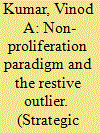

|
|
|
| 9 |
ID:
105628
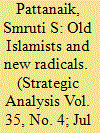

|
|
|
|
|
| Publication |
2011.
|
| Summary/Abstract |
The new radicals in Pakistan have challenged the old Islamists as represented by the religious political parties on the nature of state and the means to capture state power. These new radicals reject the 'bottom up' approach followed by the traditional Islamic political parties and prefer a 'top down' approach. Their ideological inspiration and reference point is Afghanistan under Taliban. This paper explores the relationship between the state and Islamists historically and examines how the state initiated Islamisation, in the process giving birth to new radicals that cashed in on the state's failure and posed an ideological challenge to the Pakistani state.
|
|
|
|
|
|
|
|
|
|
|
|
|
|
|
|
| 10 |
ID:
105622
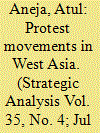

|
|
|
| 11 |
ID:
105623
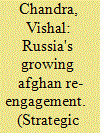

|
|
|
| 12 |
ID:
105633
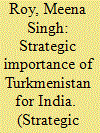

|
|
|